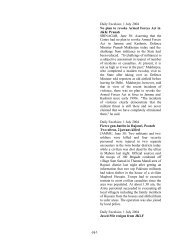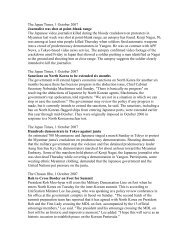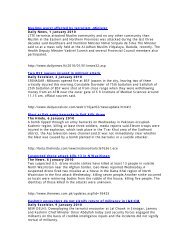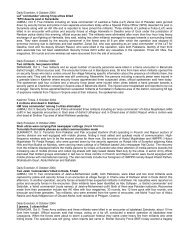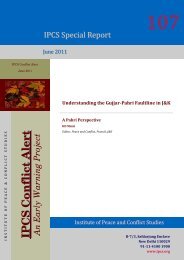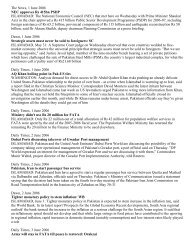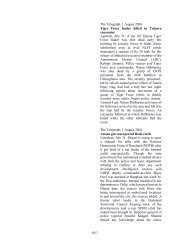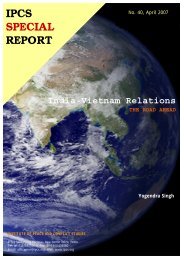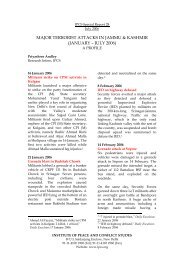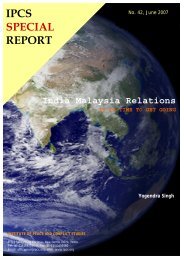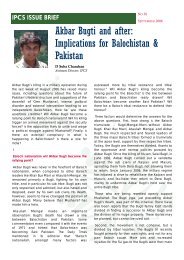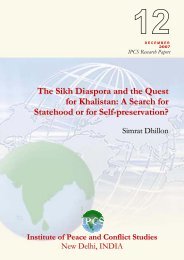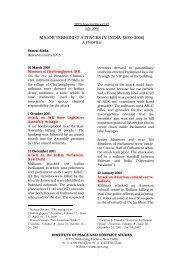April-June 2013 - Institute of Peace and Conflict Studies
April-June 2013 - Institute of Peace and Conflict Studies
April-June 2013 - Institute of Peace and Conflict Studies
You also want an ePaper? Increase the reach of your titles
YUMPU automatically turns print PDFs into web optimized ePapers that Google loves.
the growing realisation among defence analysts <strong>of</strong> the futility <strong>of</strong><br />
long drawn st<strong>and</strong>-alone military operations to end terrorism in<br />
any particular theatre.<br />
Two concepts in particular, among scores cited in the volume, will<br />
interest the readers in underst<strong>and</strong>ing why one takes recourse to<br />
violence. It is the situational <strong>and</strong> individual input variables that<br />
build the personality <strong>of</strong> an individual. The situational input<br />
variables may include provocation <strong>and</strong> frustration, whereas<br />
individual input variables are related to personality <strong>and</strong> biology.<br />
According to the social learning theory, an act <strong>of</strong> violence may<br />
seem personally <strong>and</strong> socially acceptable when considered<br />
serving a moral principle. Acts <strong>of</strong> violence <strong>and</strong> aggression will be<br />
readily learnt when a motivated-to-learn person observes others<br />
doing them. What is dangerous is that the recourse to violence,<br />
according to this, is taken not only by terrorists but also by those<br />
involved in planning <strong>and</strong> conducting counterterrorism strategies.<br />
They may change the moral value <strong>of</strong> killing to make it immune<br />
from self-censuring restraint. The “rogue” elements among the<br />
security forces may be victims <strong>of</strong> the theory as they find social<br />
acceptability for their immoral acts. This paradox, according to<br />
the authors, cannot possibly be solved even through giving<br />
socially tolerable labels such as “war on terror”, <strong>and</strong> will remain a<br />
challenge for democratic societies <strong>and</strong> countries that are<br />
expected to justify counter-violence, resulting in what is<br />
commonly referred to as human rights violations.<br />
The other is the assumption <strong>of</strong> the terror management theory,<br />
which stipulates that people are motivated by their latent fear <strong>of</strong><br />
death <strong>and</strong> desire to transcend their inevitable demise. One way<br />
that allows people to deny their morality is by attaching the self<br />
to something larger than oneself, which will continue to exist long<br />
after their death. Thus, aggrieved people are able to find<br />
solidarity <strong>and</strong> hope for a better future in an organisation, <strong>of</strong>ten<br />
directed by a charismatic leader that uses a compelling ideology<br />
to elevate the struggle against the perceived oppressor to a<br />
“sacred” level that construes the killing <strong>of</strong> innocents as justified<br />
<strong>and</strong> even necessary. The example cited in this case, is the<br />
message <strong>of</strong> Osama bin Laden that America had ruthlessly<br />
belittled the Ummah <strong>and</strong> therefore, hostility towards America<br />
was a religious duty. The ideology used can be religious, secular<br />
<strong>and</strong> even atheistic but becomes increasingly sacred - <strong>and</strong> thus<br />
beyond question or rational debate. Groups advocating suicide<br />
killings portray the action as self-sacrifice to win Allah's favour<br />
<strong>and</strong> liberation from sins. However, the authors have been<br />
emphatic in asserting that religion is seldom the problem or a<br />
cause <strong>of</strong> terrorism. It is the religious fervour <strong>and</strong> dogma, which<br />
are <strong>of</strong>ten used to legitimise acts <strong>of</strong> terror.<br />
After elucidating on psychosocial issues, the second half <strong>of</strong> the<br />
compilation focuses on psychosocial avenues to counter<br />
terrorism. The most common counterterrorism strategy in vogue<br />
today is the withholding <strong>of</strong> political concessions, granting political<br />
concessions, or providing peaceful outlets for political change.<br />
This “strategic model” presupposes that terrorists are rational<br />
actors who attack civilians to achieve political ends, <strong>and</strong> is based<br />
on antiquated views <strong>of</strong> the classical model <strong>of</strong> organisational<br />
theory that members participate in an organisation to merely<br />
achieve its goals. It has been argued on the basis <strong>of</strong> theoretical<br />
<strong>and</strong> empirical evidences that terrorists are rational people <strong>and</strong> in<br />
conformity with the “natural systems model”, join organisations<br />
to achieve social solidarity <strong>and</strong> not their <strong>of</strong>ficial political agenda.<br />
Therefore, terrorist organisations seek to prolong their existence<br />
even when doing so impedes its <strong>of</strong>ficial goal. If terrorists attach<br />
utmost importance to the social benefits <strong>of</strong> using terrorism, a<br />
strong case has been made for a re-look at the current counter<br />
strategies based on reducing terrorism's political utility.<br />
For devising a counter strategy, the study <strong>of</strong> choice <strong>of</strong> targets by<br />
terrorists has been highlighted. This will not only allow hardening<br />
the targets according to their vulnerability, but also helps<br />
anticipate how terrorists will respond to situational interventions<br />
thus continually facilitating the renewal <strong>of</strong> counterterrorism<br />
agencies' defences. A sound suggestion emanates regarding the<br />
use <strong>of</strong> the Internet to counter terrorism propag<strong>and</strong>a through<br />
scholars <strong>and</strong> nongovernmental organisations. Strong legal<br />
measures towards cyber security, as laid out in the ITU's Global<br />
Strategic Report <strong>of</strong> 2008, have been recommended. The<br />
importance <strong>of</strong> ethical pr<strong>of</strong>essional interrogation <strong>of</strong> terrorists as a<br />
sound counter terrorism strategy has been discussed at length.<br />
Seeking to attack the underlying ideology <strong>and</strong> the conditions that<br />
sustain violent Islamist terrorism in Indonesia through educating<br />
people is the theme <strong>of</strong> one particular chapter. The pesantren,<br />
largely rural based centres <strong>of</strong> exclusively Islamic education, have<br />
started teaching secular subjects <strong>and</strong> provide vocational training<br />
up to university level thanks to the 1989 Indonesian Education<br />
Law that equates madrasas <strong>and</strong> pesantren to “secular schools”<br />
who must employ the national curricula issued by the Ministries<br />
<strong>of</strong> National Education <strong>and</strong> Religious Affairs. The recent<br />
breakdown <strong>of</strong> order in states like Libya, Syria, Sudan, Somalia,<br />
<strong>and</strong> Yemen has created breeding grounds for terrorist groups to<br />
increase their influence. The Muslim Ummah is increasingly<br />
disturbed <strong>and</strong> politically radicalised, not so much by Al Qaedalike<br />
groups but by socio-political movements like the Muslim<br />
Brotherhood. The Indonesian example should serve as a model<br />
to prevent youth falling prey to extremism <strong>and</strong> violence.<br />
Recruitments by Islamist extremists will have to be checked,<br />
images <strong>of</strong> leaders reduced to obscurity, their narratives publicly<br />
falsified <strong>and</strong> citizens reached out to creatively communicate a<br />
positive narrative favouring progress, cooperation, <strong>and</strong> justice.<br />
The centre-stage spirituality needs to occupy, as an upholder <strong>of</strong><br />
peace <strong>and</strong> non-violence, has been flagged in a number <strong>of</strong> papers.<br />
Most religions share core values <strong>of</strong> love <strong>and</strong> compassion. People<br />
have to be reminded <strong>of</strong> their religious compassionate teachings<br />
to reduce perceived hostility. The voice <strong>of</strong> hatred has to be<br />
muted. It has rightly been argued that spirituality will have to play<br />
a great constructive role in once again leading human history<br />
towards a new age <strong>of</strong> progress.<br />
The compendium is a must read for those entrusted with the task<br />
<strong>of</strong> formulating policies to prevent terrorism <strong>and</strong> to devise<br />
counterterrorism strategies. It will be equally useful for those<br />
involved in counterterrorism operations. The military option is<br />
easy to launch, but its deleterious effects are well recognised.<br />
Therefore, societies will have to choose the right mix <strong>of</strong><br />
instruments, including psychosocial prescriptions, if spiralling<br />
violence initiated by acts <strong>of</strong> terror followed by counterterror<br />
violence by the state is to be checked. It is the psychosocial<br />
effects that make terrorism “tick” <strong>and</strong> therefore, the key<br />
challenge lies in underst<strong>and</strong>ing <strong>and</strong> counteracting these<br />
psychosocial consequences.<br />
Readers unfamiliar with psychosocial theories <strong>and</strong> terminology<br />
may struggle slightly in underst<strong>and</strong>ing certain concepts<br />
enumerated in the volume. However, due credit must be given to<br />
the authors for relating various concepts to field examples,<br />
making the narrative easy to underst<strong>and</strong> <strong>and</strong> an extremely useful<br />
addition to the literature available on countering terrorism.<br />
South Asia Plus 39



